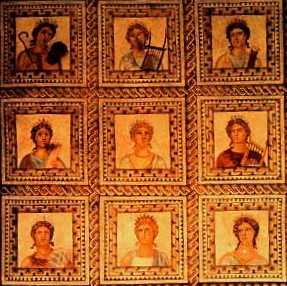


|

|
DEUTSCH | ENGLISH | ESPAÑOL | FRANÇAIS | ITALIANO | LATINO | PORTUGUÊS
The Camenae were originally water sprites associated with a sacred spring in Rome. They were eventually associated with the Greek Muses, the Goddesses of the arts, history, and music. Poets, musicians, and others held them not only as their patrons but as their inspiration. It is in this spirit that we employ their names to pursue the study of Roman art, literature, music, and history. While many of the sections below do not yet have anything under them, we welcome all efforts of our Citizens and others to produce either articles on the topics below, or to create their own works to be showcased herein.

Horace, Odes (Latin and English)Lucan, The Civil War (English)
Ovid, Metamorphoses, concordance (English)
Ovid, Metamorphoses (English)
William Shakespeare, The Rape of Lucrece (English)
William Shakespeare, Venus and Adonis (English)
Vergil, Aeneid (Latin and English)
Vergil, Aeneid, concordance (English)
Vergil, Aeneid (English)
Vergil, The Eclogues (English)
Vergil, The Georgics (English)Audens, Pompeii et Herculaneum (English)
Annals of Nova Roma (English)
Historical Timelines (English)
RegnumApuleius, The Defense (English)
Republica
Imperium
Nova Roma
A timeline of Rome and the Byzantine Empire, 800 BC-1453 AD by Gaius Sentius Bruttius SuraAugustus, The Deeds of the Divine Augustus (English)
Marcus Aurelius, The Meditations (English)
Julius Caesar, The African Wars (English)
Julius Caesar, The Alexandrian Wars (English)
Julius Caesar, The Civil Wars (English)
Julius Caesar, The Gallic Wars (English)
Julius Caesar, The Spanish Wars (English)
Cicero, Works (Latin and English)
Epictetus, The Discourses (English)
Epictetus, The Enchiridion (English)
Epictetus, The Golden Sayings (English)
Epicurus, Letter to Menoeceus (English)
Epicurus, Principal Doctrines (English)
Galen, On the Natural Faculties (English)
Gibbon, The Decline and Fall of the Roman Empire, concordance (English)
Hirtius, Continuation of Caesar's Gallic War (Latin and English)
Josephus, Jewish Antiquities (Greek and English)
Josephus, The Jewish War (Greek and English)
Josephus, Life of Josephus (Greek and English)
Josephus, Works, concordance (English)
Livy, Ab Urbe Condita (Latin)
Livy, Ab Urbe Condita (Latin)
Livy, The History of Rome (Latin and English)
Livy, The History of Rome, concordance (English)
Lucretius, On the Nature of Things (English)
Plotinus, The Six Enneads (English)
Plutarch, Works (English)
Porphyry, On Images (English)
Quintus, The Fall of Troy (English)
Strabo, Geography (Greek and English)
Tacitus, Annals (English)
Tacitus, Histories (English)
Tacitus, Histories (English)
Tacitus, Histories, concordance (English)
Suetonius, The Twelve Caesars (English)
Sites of Roman Interest in the South of France
A site with pictures and maps from Roman Gaul.
William Shakespeare, Anthony and Cleopatra (English)
William Shakespeare, Coriolanus (English)
William Shakespeare, Julius Caesar (English)
William Shakespeare, Timon of Athens (English)
William Shakespeare, Titus Andronicus (English)
Theatron has electronic exhibitions on Roman wall paintings, temporary stages and permanent theaters, based on computer modeling and archaeological evidence.
Marcus Cassius Julianus et Patricia Cassia, Roman Republican (English)
![]()